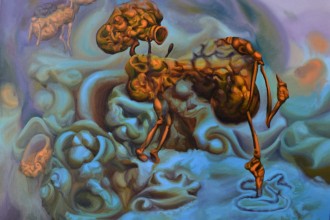A beautiful brunette in her late thirties or early forties greeted him at the front desk and opened the register. Stefano was now sitting in one of four big chairs in the hotel’s lobby, the suitcase at his feet. His forehead was covered with sweat and large halos decorated the armpits of his T-shirt. The midday heat swelled through the open door.
“Signor…?â€
“Salomonsen.â€
Recalling the wacky spelling he had read on the Stefano’s sign, he spelled it out for her.
“Ah yes … The administration is sending you, yes? Room thirteen. You’re not superstitious, I hope?â€
Salomonsen shook his head, but he thought the number was eerily well chosen.
***
The room was small, clean and comfortable. Salomonsen hoisted his suitcase on the bed and looked at his new surroundings. A rustic cabinet stood against the wall, a little table was installed under the window and the bedside table was decorated with a lamp adorned with a cardboard lampshade. The bathroom consisted of a shower, a toilet and a functional sink.
“Perfect!†he commented happily.
He opened the window and the joyful shouts of the city spilled inside the little room.
***
“Stefano can show you around the city, if you want,†the hotel owner offered when Salomonsen came down the stairs again. “It’s the holidays and he has plenty of time on his hands.â€
The surveyor nodded. The boy got up from the chair where he sat and motioned to Salomonsen to follow him. The woman flashed a smile as he walked out the door. It was a friendly smile, but he wondered what she meant by that.
***
Stefano walked very quickly and Salomonsen had sometimes difficulties following. Several times he found the boy waiting for him at the top of a street, smiling as if he had pity on the “poor old man.†After the fifth time, Salomonsen felt like saying: “I’m only forty-three years old, dammit! I’m not an old man!†But he remembered immediately that he was going to die soon and that it wasn’t particularly a sign of youthfulness.
***
They visited the old harbor, the fourteenth-century cathedral with its seventeenth century rood screen, the old city, the cloister and finally the local folk art museum. When they came out of it, Salomonsen was feeling pretty tired and he proposed to Stefano to sit at the terrace of a café. Once installed, Salomonsen ordered a beer for himself and Stefano chose a lemonade.
“You want a cigarette?†he asked the boy.
“Thank you.â€
“They are unfiltered, just so you know.â€
“I don’t care. Tobacco is tobacco.â€
Handing him the package, Salomonsen suddenly realized that the boy’s eyes fascinated him. They had something exceptionally beautiful and attractive.
Here I am, thinking like that old Aschenbach in ‘Death in Venice’, he told himself, fanning with one hand the smoke that bothered him.
“What are you here for, exactly?†Stefano asked, while a waitress put down the glasses in front of them.
Salomonsen stretched and cracked his knuckles. He hesitated to tell the truth, for he knew that the project of the administration was not very popular on the island. On the other hand, everyone would know soon, so he preferred to be honest.
“I have come to do some measurements. I am a surveyor. The administration has, uh, this project, you know… How old are you, by the way? Sixteen, seventeen?â€
Stefano smiled.
“Nineteen. But everybody thinks I’m younger. Later, I’ll take that as a compliment, I guess.â€
The surveyor smiled back.
“The government wants to build an observatory near the old volcano and I have to take measures of the ground.â€
“Near The “Old Man?â€â€
Salomonsen raised an eyebrow
“The “Old Manâ€?â€
“It’s the nickname of the volcano here. Isn’t it a little dangerous to build something there?â€
Salomonsen looked at his half empty glass.
“In theory, no. It has been inactive for nearly 1000 years. The geologists and seismologists of the ministry have given the green light. What’s more, it’s a few miles away. And frankly, that’s not my problem. I’ve come to measure, that’s all. What can happen after that…â€
He shrugged, suddenly feeling like King Louis the Fifteenth of France.
Après moi, le deluge.
Sébastien Doubinsky is a bilingual French writer, born in Paris in 1963. An established writer in France, Sébastien Doubinsky has published a series of novels, covering different genres, from classical literature to crime fiction, as well as a few poetry collections. His novels, The Babylonian Trilogy (Goodbye Babylon in the US), The Song of Synth and Absinth have been published in the UK and the US. Three of his poetry collections, Mothballs, Spontaneous Combustions, and Zen And The Art of Poetry Maintenance have been published in the UK. He currently lives in Aarhus, Denmark, with his wife and his two children, where he teaches French literature, culture and history.
Editor’s Note: This is an excerpt from Sébastien Doubinsky’s novel ‘Le livre muet’, originally published by éditions du Cherche-Midi in 2007. The English translation has been published here with kind permission from the author.




